Special Edition vehicles are nothing new to the automotive world, and it would be fair to consider that any car from the early 1900s with a coachbuilt body could fall into that category. However, the practice increased post-war as manufacturers sought a sales edge over the opposition. This 1961 Chrysler Newport is a perfect example of the breed, with its interior trim combination interesting and undoubtedly distinctive. It is a solid and original survivor needing a new home. Therefore, this classic is listed here on eBay in Buckeye, Arizona. The seller set their BIN at $17,000, although there is the option to make an offer.
Chrysler granted the Newport standalone model status in 1961, pitching the car as an entry-level model that filled the gap left by De Soto’s demise. It didn’t feature the automotive “tinsel” found on more expensive vehicles within the Chrysler range, but buyers could tick enough boxes on the Order Form to avoid a bare-bones feel. That brings us to the first point to consider with this classic. It wears a paint combination of Midnight Black and Alaskan White, and nothing seems extraordinary there. However, the darker shade wasn’t featured on the Chrysler color charts for 1961. It was reserved for the Dodge and Plymouth range for that model year. The seller claims this car is original, suggesting the first owner may have splashed a few extra dollars on Special Order paint. The overall presentation is all you might expect from an unrestored survivor. The paint has accumulated a wide selection of scratches and chips, and there is wear-through on some horizontal surfaces. It would undoubtedly benefit from a cosmetic refresh, but preserving its survivor status would be viable. The panels are straight, with only a few minor imperfections. I located a recent listing for this car, confirming it is rust-free. Anyone with prior experience with cars of this vintage will acknowledge that it is a major victory. The windlace on the doors is worn and does require replacement to keep dust and moisture at bay. The trim is in good order for its age, and the original glass looks excellent.
Okay, this is what the song-and-dance is about with this Newport. Chrysler introduced the Highlander Package as a Special Edition to improve sales in the spring of 1961. Dealers received notification detailing the marketing strategy via a company bulletin in March. The heart of this Package was interior trim in Blue, Green, and Red McDuff tartan. It was undoubtedly a bold strategy, producing an appearance that probably still divides opinions. One highlight for me is the “AstraDome” gauge cluster. Detroit was doing sterling work on innovative gauge cluster design during this period, but I rate this as one of the best. The seller confirms that this interior is almost totally original, with the front seatcover being the only replacement item. The seats and other upholstered surfaces are free from wear, the carpet and dash are clean, and the White and Translucent wheel only sports a couple of minor cracks. The same is true of the pad, but the interior has no immediate cosmetic needs if considered a genuine survivor. The original owner ordered this classic with air conditioning, and although it was updated to R134 refrigerant, it doesn’t blow cold. The turn signal switch operates but must be held in place, or it will self-cancel. Buyers didn’t receive a lot of comfort or luxury features with the Newport, but this car retains its original and functioning AM radio.
Powering this Newport is its original 361ci “Firebolt” V8. The remaining mechanical components include a three-speed automatic transmission and power assistance for the steering and brakes. The “Firebolt” produces 265hp and 380 ft/lbs of torque. That makes it an effective open-road cruiser where the driver could peg the needle at 70mph and remain at that speed all day. Potential buyers will appreciate that this Newport is in excellent mechanical health. The work performed over the last four years is extensive, with the rear suspension receiving new springs and shocks and the brakes receiving a new master cylinder, wheel cylinders, and other components. The seller added an electronic ignition system for reliability and easier starting, but this Chrysler is otherwise unmolested. It is a turnkey proposition offering a new owner immediate driving pleasure.
This 1961 Chrysler Newport is a fascinating vehicle, courtesy of its interior trim and what appears to be Special Order paint. It is unclear how many Highlanders rolled off the line that year, but a search of the Barn Finds archive confirms this is the only 1961 example we have seen. Rarity doesn’t necessarily equate to a high potential value, but the seller’s BIN looks competitive for a car with this option combination. Of course, there is the facility to make an offer, and that could be the best strategy if you view this as an automotive “must-have.” I always encourage a respectful approach in such situations, and I will be interested to learn if any readers choose to pursue this classic further.
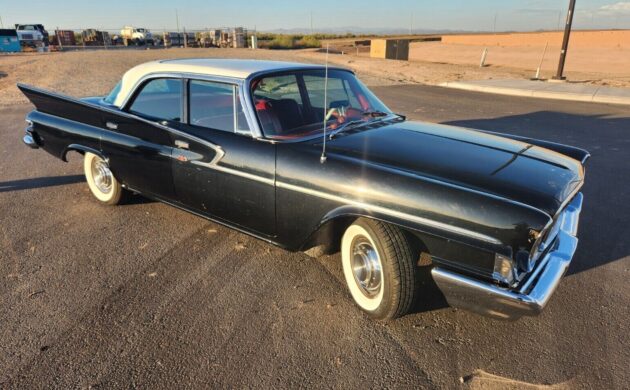
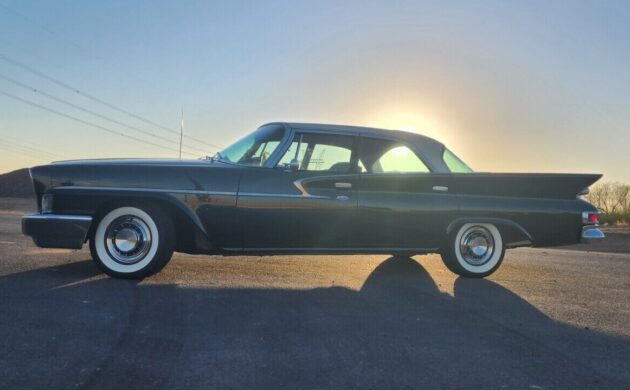
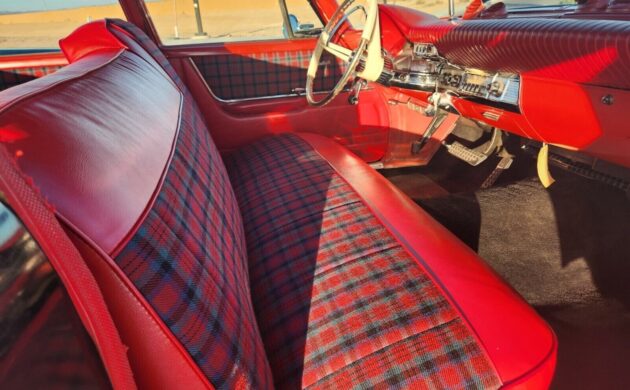
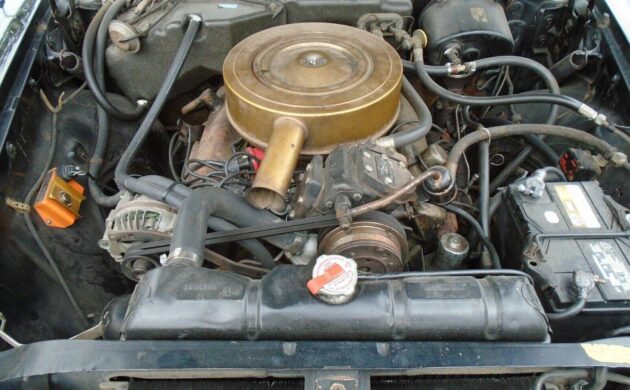
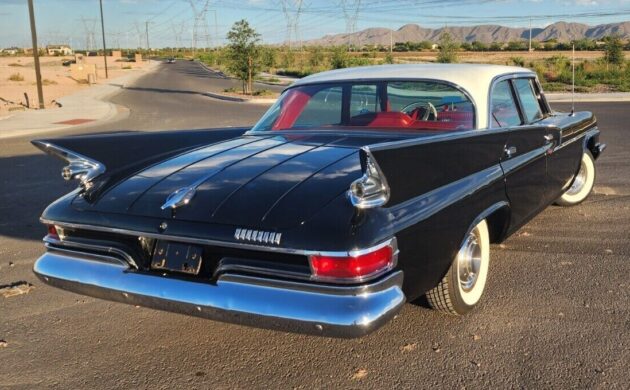


What’s not like on this beauty
straight solid, unique. The interior is great, although it does make me think of food and a nice picnic by the lake in the summer.
Wonderful original condition. Great daily driver in nice weather to.
“Highlander”, you say? I wonder how long Toyota waited for that name to become available again. These cars pretty much divide us, either we love them or hate them. I’m in the “love them” camp, as aside from a ’59 DeSoto, the 1st car I remember, they exhibited styling unmatched, and never to return. It’s as if, “they” opened the spigot on excess and gawdy, and this was the result. Bamboozle the public with options, and it worked,,,for a while. People grew tired of these, as more conventional designs prevailed, until the late 60s/70s, when it started all over again. So many gee-gaws, the gauges( fantastic at night), the drivers seat back, padded dash, that “sister in law in the back seat” rear view mirror, a/c that could cool an office building, THIS was what Chrysler was all about, real road cars that were different. Yeah, can you imagine everyone NOT driving the same jellybean? Our folks had some class and showed it by the cars they drove. The ’61 Chrysler was one of them.
Hey, hey, “edit” feature is back,,,
I’ll put the $17,000 towards the jelly bean, at least the air and the turn signals will work!
Too bad the interior is so nice…I’d trim it in my clan tartan and proudly drive it home in Newport!
Actually the Highlander interior trim package appears sporadically by Chrysler much earlier. I have seen it on an earl 1940s Business Coupe and believe it was available a number of other years.
My Dad had a 1949 Chrysler Highlander 6 cylinder, Fluid drive back in the early days of my life , I was born in 1947, it was Thunder Grey and the interior was a Oxblood colored Leather and Wool in a Tartan Plaid, much like this one listed here . The fender emblem said Highlander . He kept that Highlander until 1959 when he bought a Blue/Blue Imperial 4 door Hardtop. As I remember that Highlander had well over 100K miles on it when he sold it to a neighbor, it ran well for a car with that many miles but used a quart of oil every 100 miles or so.
If I only had a place to put it, I’d buy it right now at that ask.
Does not deserves to rust away in Northeast weather, and I already have a car in the heated garage.
The fins were looking a little passe by 1961, it is beautiful. Totally different from a Ford or Chevy, but a real eye turner. No pun intended, referring to the goo goo eye headlights.
Neighbor had one with a factory 4-speed a real cruiser
3 speed maybe, no 4 speed available in Chrysler cars in1961. I believe they first offered 4 speeds in 1964.
I thought that they had a Pont-a-Mousson box from France for the 300s., but I think it was on the ’60 F model and very rare.
I remember when I was a kid one running around town, that was converted to a pickup, had the factory 3 sp. stick on the floor. That shifter looked like it came out of the J.C. Whitney catalog. I read the reason was a column shifter could not clear the astro dome dash and some old guys still wanted a manual trans.
Dusty Riders,
Yes, a few of the French 4-speeds were made available on special order, I think the total production number for the 300f cars was 9, and 4 are known to exist. To order one required an “in” at Chrysler, with all the versions ordered for racing, I believe it was for NASCAR racing. To learn more, visit the 300F page here: https://300f.com/4speed.htm
In the early 1980s I bought a 1961 New Yorker wagon that was a special order with the full 300f drive train and the P-A-M 4-speed, I suspect it was the only one built. It was basically equipped with every option, even dual A/C.
The original owner’s son [I bought it from his dad’s estate] said the old man wanted it to tow a very large wooden cabin cruiser made by Owens. A Chrysler expert at my restoration shop collected letter series cars and Imperials, and he looked the car over very carefully, concluding it was an original car.
I sold him the car a few years later, because it was terribly rusted from sitting in tall grass for years. He parted it out. I should have kept all the stick shift parts because about 1987 I ended up with a Facel-Vega Excellence and would have converted it to the 4-speed, just like Facel offered.
That instrument cluster is really cool.
In 1972 I found a former horse stable building behind a large Victorian manor house that the homeowner was willing to rent to me, so I could have a place to work on my 3 Packards. However she said I would have to get rid of the car in the garage. The car turned out to be a 1961 Newport 2-door hardtop with only about 15,000 miles showing, and it never spent a night outside of the garage. It was light blue with white top, and blue interior. The homeowner said the car was bought new by her mother.
Gave the car to my brother, and with very little effort [new battery and hydraulic brake rebuild] he drove it to high school and college for years.
The whole thing just works! Plaid is rad!
Some 30 years ago a local NE WI private party was selling a relative’s ’61 Newport 4 dr that the relative had purchased new. The car was original and in stellar condition. It, too, had the Highlander interior and was grey with a white roof. It had dog dish hubcaps and blackwall tires and, unusually, a 3 speed manual floor shift. The seller indicated the relative had ordered the car. I’ve not seen the car since and often wonder if it survives.
I believe that ‘black is black’. Code BB-1, Formal Black is an RPO color on 61 Chryslers. I don’t see that calling it “Midnight Black” would make any difference. Ebony Black, Raven Black, Onyx, etc. are all still ‘black’.
With the demise of DeSoto, Chrysler had a wider gap between the Dodge Polara and the Chrysler, so the Newport trim line was new for 61. In order to have an even lower advertised MSRP, which was a big deal in 61, the ad writers wanted a manual trans to lower the cost by another couple of hundred dollars. Hence, the 3-spd floor-mounted shifter as standard equipment on Newports. I’m sure it was not common, but it was the base tranny on a Newport with the Torqueflite being optional.
At least 30 years ago I met a driveline mechanical engineer for Chrysler Corp by the name of Bob Kelly. Bob told me about how Chrysler dealers were clamoring for the ability to order full size Chryslers with stickshift. One of the reasons was because some police departments wanted such vehicles on a fleet basis. But he said the primary reason was so they could advertise a Chrysler Newport at a cheaper price.
As all Torqueflites were push-button, offering a column shift stick shift would be a lot of work to produce, so they settled on the floorshift.
As mentioned above, the Highlander plaid upholstery was available, and actually quite popular in Chryslers of the 40s and early 50s So it was hardly “introduced” in 1961. Adam please tell me you knew that…….right?
My grand parents had a new 61 Newport in silver with the red Highlander package. I remember seeing an all black one and also white.
Here’s a picture of the cool gauge cluster that Adam mentions but did not include a picture of in his writeup.
The “Firebolt” produced 265hp and 380 ft/lbs of torque which seemed powerful compared to some of the cars on the street at that time. You could cruise all day at 70-75 without breaking a sweat. The 361 seemed to be a tough engine and most would make it to 100,000 miles with no problems. The 361 with its shorter stroke seemed to run a lot better that the 383 in my dad’s cars in my opinion.